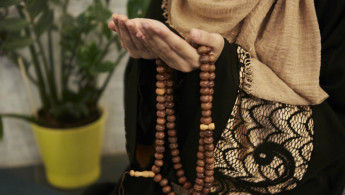The spiritual significance of Ramadan
The holy season is one which also allows Muslims to not only develop a much deeper relationship with Allah, but also with themselves, their family members, their friends, and their overall community.
Ramadan is not only a time rich with religious benefits, but also one plentiful in spiritual and health benefits too.
Although Muslims and the Quran have insisted on the health and spiritual benefits of fasting for the past 1400 years, it is only now that modern science and medicine has figured out these benefits for themselves.
Doctors are now using fasting as a method to help lower patients' blood sugar, stating that a lack of food can cause your body to use its stored glucose (aka sugar) throughout the day and as a result, leave you with lower blood sugar levels.
 |
As our perspective has been forced to shift, we are able to see different mediums that will help create a feeling of content within us |  |
A study by the United Arab Emirates University found that the consumption of dates, most commonly used by Muslims to open their fast with, helps control the blood sugar of diabetic patients due to its low GI (glycemic index) – the lower the GI, the less likely you are to get a spike in blood sugar.
Furthermore, in a study conducted by Dr Longo and his colleagues, published in the journal Cell Stem Cell, it was found that fasting destroyed the old and damaged immune cells in mice and generated new ones, as well as extended their lifespan.
In fact, when furthering their study and testing the diet on humans, they found that it reduced several risk factors associated with aging, cardiovascular disease, diabetes, and cancer.
 |
|
| The consumption of dates has been found to help control the blood sugar of diabetic patients [Getty] |
Ramadan also consists of a multitude of spiritual benefits too. Personally, for me, alongside millions of other fasting Muslims, it has been found that the month is effective in the breaking of bad eating habits and helps with the removal of food dependency.
To many people, food has a huge emotional significance in their lives. Whether they're upset, angry, stressed, or even happy, people seem to turn to food to either rewards themselves or help make themselves feel better. As a result of this, the purpose of food – to feed us – has been removed and replaced with other purposes, therefore leading to our unhealthy relationship with it.
During the month of Ramadan, the separation between man and food for 30 days allows for us to break the habit of leaning on food whenever we are in an emotional state.
Instead, we can turn to other things to rewards ourselves or fill this void such as exercising, writing, reading, praying, reading the Quran, etc. As our perspective has been forced to shift, we are able to see different mediums that will help create a feeling of content within us.
This breaking of bad habits doesn't just stop at eating, but consists of an array of them, such as masturbation and watching porn. Although masturbation is healthy, many have developed an obsession, with some people unable to go a day without doing it or watching porn because of dependency.
Experts state that it takes 21 days to break a habit. As Ramadan is 30 days, this allows plenty of time to deal with and break whatever habit or addiction we are plagued with.
 |
Experts state that it takes 21 days to break a habit. As Ramadan is 30 days, this allows plenty of time to deal with and break whatever habit or addiction we are plagued with |  |
On top of this, as we are not eating or drinking throughout the day, this then allows for our minds to become freer. Throughout the day, many of us may not have realised but, we spend a lot of our time thinking about food.
Whether we're daydreaming about food, thinking about what food we need to buy, or what we should eat for breakfast, lunch, or dinner, a lot of our time and thoughts are dedicated around food.
This is simply due to how a lot of our time is spent eating or drinking – think about it, when was the last time you left your house without thinking about or eating something along the way? As our meals are limited to one or two during our fast, we are subsequently left with a much clearer mind as we spend less time eating or thinking about food, and more time organising our thoughts and becoming more in tune with ourselves and our needs and wants.
Moreover, during this month, not only do we build a much better understanding of ourselves, but we also grow closer towards God. Ramadan asks us to use our fast as an opportunity to become more in tune with Allah and our religion. Many do this through reading the Quran, making dua, and of course – praying. The night prayer, taraweeh, also has a special consideration that is different from any other time of the year.
Prophet Muhammad said regarding taraweeh prayers that: "Whoever prays during the nights of Ramadan (taraweeh) with a firm belief and hoping for reward, all of his previous sins would be forgiven."
This Hadith emphasises the importance of taraweeh in Ramadan. This prayer is also a way of seeking forgiveness for the previous sins and brings additional reward to a Muslim. The idea that prayer, especially taraweeh, can clean away all of your sins and leave you as pure as you were when you were born, allows for a sense of peace to many Muslims.
 |
Not only does fasting improve both physical health and spirituality, but it has also been proven to help improve mental health |  |
Ramadan, in a way, provides an alternative for many who cannot afford to make the religious pilgrimage to the holy city of Mecca to perform Hajj, where after performing it, all their sins are guaranteed to be forgiven. Taraweeh offers the same result through prayer every night at the mosque. This also helps to decrease stress and shame some Muslims may feel.
Another benefit to Ramadan is found through the recitation of the Quran, which not only produces a tranquil heart and mind, but improves memory.
Mental disorders are one of the common worldwide problems, but many studies have reported the beneficial somatic and mental effects of Ramadan fasting on human. In a study conducted by the Rafsanjan University of Medical Sciences in Iran, it was found that fasting helped improve the mental health of medical students.
For thousands of years, Muslims have spoken out about the advantages that fasting has provided them – both health and spiritually wise. As time goes on, the true benefits of Ramadan and the Quran will continue to be discovered and believed by the world.
Etaf Adam is a blogger at Modest Health Blog covering a wide range of topics including racism, religion and fitness. She is currently attending Russell Group University where she is studying to achieve her degree in English as well as working on a new piece centered around sex and the Muslim community.
The New Arab's Ramadan Series: Click on our Special Contents tab to read more on Ramadan 2018:
 |



